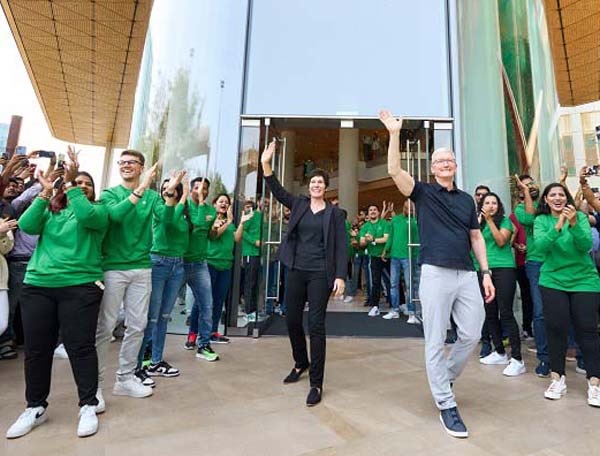
By Anand Parthasarathy
Two weeks ago, global research analyst Counterpoint released a report on the Indian smartphone market. It revealed that shipments of Apple’s iPhone crossed the 10-million mark, helping it capture the top spot in revenue for the first time ever in a calendar year. Samsung sold more phones but Apple made more money in India, because on average an iPhone costs three times as much as most other premium phones.
In other ways too, 2023 has been a year when Apple grew and consolidated in India in multiple directions: The company now makes iPhones in India through three contract manufacturers – all Taiwanese: Foxconn, Pegatron and Wistron. The India plants of the last named company have now been acquired by the Tata Group.
Apple has been present in India for 25 years, first selling its Macintosh range of PCs and laptops as well as the iconic iPod music player. When it launched the iPhone in 2007 it put hardly any sales effort into the India market and even after it started making the phones here a decade later, it still did a pretty scrappy job of marketing through partners rather than opening its own stores.
Incredibly, the first company owned Apple store was opened in India by CEO Tim Cook, only in April 2023 in Mumbai’s Bandra-Kurla Complex, followed a few days later by a second outlet in Delhi’s Saket.
The story of Apple in India was for decades a sorry tale of arrogance and prejudice. As a teenager, in Oregon (US), Apple’s founder, Steve Jobs, a college drop-out, was so hard pressed for cash, he is said to have lunched for free in the local Hare Krishna temple. In the mid-1970s, he backpacked to India looking for spiritual salvation, shaving his head and changing, albeit briefly, to Indian clothes when he returned. What he saw of India in the pre-liberalization days, obviously did not encourage him to think of this country as a significant market – and clearly he never updated his perceptions or modified his prejudices, in later decades. The price of an iPhone in India was significantly higher than its international dollar price -- and this could not always be explained away by the prevalent import duties. Each new version reached India, often months after its global release.
For some years after Job’s death in 2011, it looked like being a case of 'his master's voice' with successor Tim Cook. Then he thankfully displayed some attitudinal changes with respect to India. Finally, after a visit to India in May 2016 and his meeting with Prime Minister Narendra Modi, Cook decided to "make in India", though starting with the older models. Last year, push came to shove – and the latest iPhone 15 rolled out of an India-based factory and reached Indian buyers along with the rest of the world.
That is not the end of the story. An Apple analyst Ming-Chi Kuo has been quoted by Reuters suggesting that Apple may also look to India for developing future iPhones, not just making them. He said the three India plants could begin the development process as early as the second half of 2024, for iPhone 17, a device which won’t be launched till late 2025.
Nice to know that Apple recognizes India’s potential for design and innovation – something that the world’s biggest tech enterprises have been leveraging for at least 20 years, through captive R&D centres.
Under its founder, India fell off Apple’s map. Under Tim Cook it seems to be central to the company’s future plans, with one in four iPhones of the future rolling off an India plant.
As they say, better late than never. Welcome to the club.